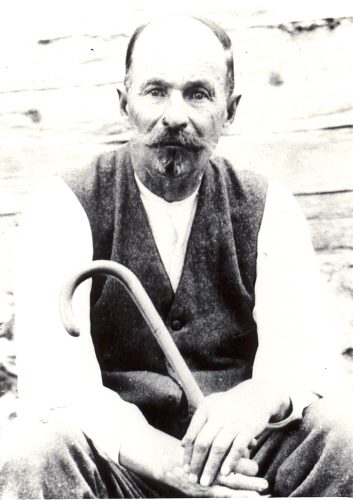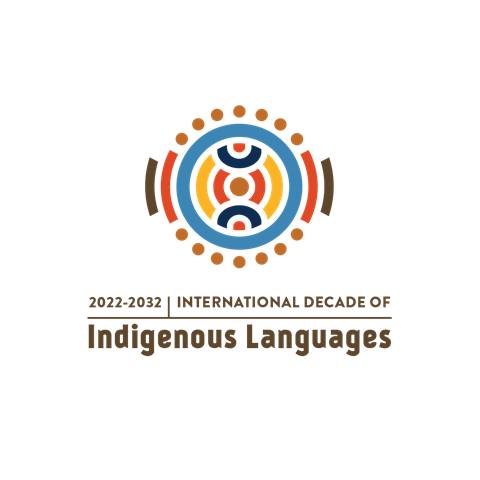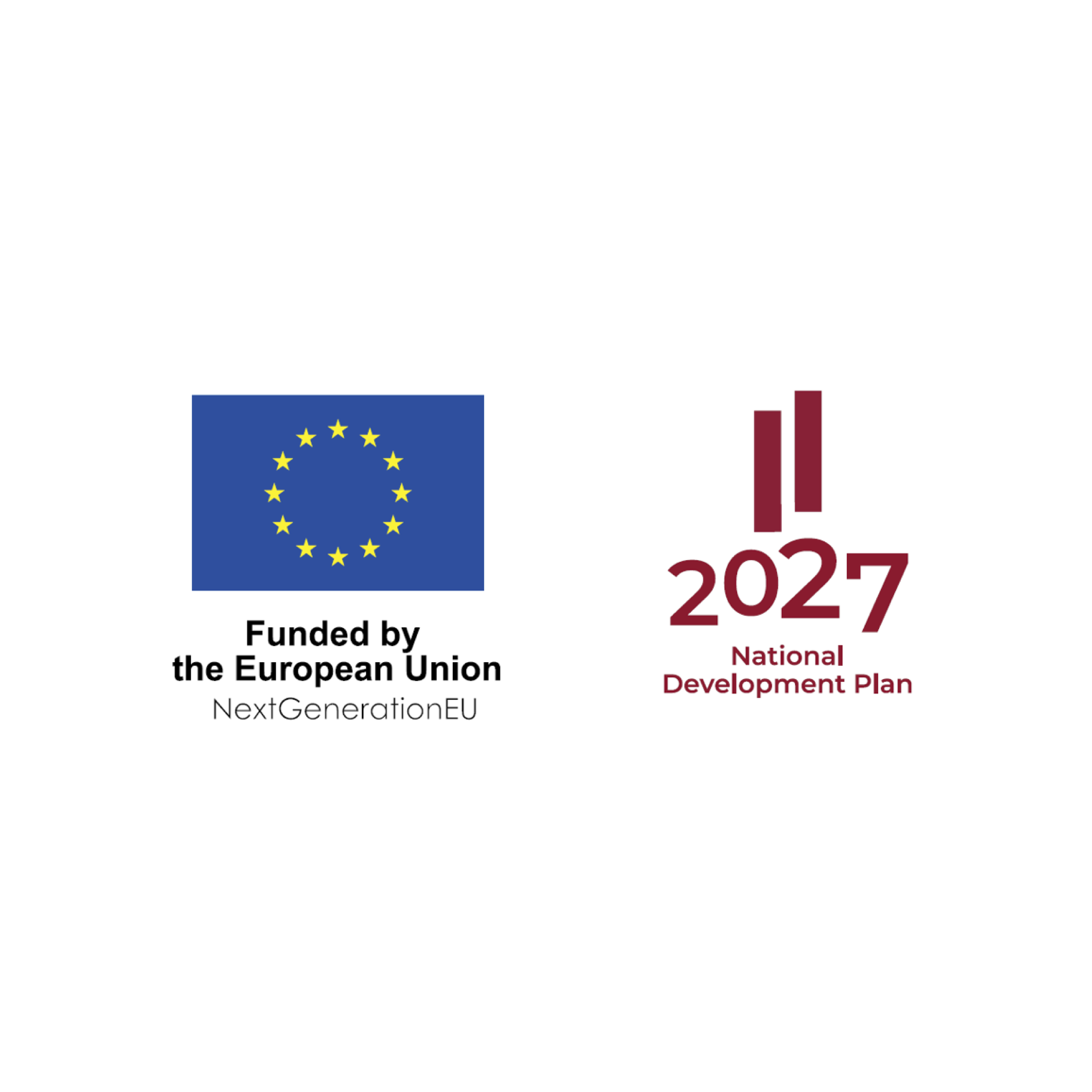December 30
The first song for the project “Sing along and learn Livonian!” has been published
Sing along and learn Livonian! project’s first song with Julgī and Lelū Stalte has been published – Lēba.
December 11
A new song project in the makings “Sing along and learn Livonian!”
New songs are begun to be made for the purpose of learning the Livonian language. The project was made possible with the support of State Culture Capital Foundation (SCCF). Read more.
December 8
Tallinn English College meets Valts Ernštreits and learn about Livonians and the Livonian language and culture
Tallinn English College had a unique opportunity to meet Valts Ernštreits, a Livonian and a researcher of Livonian language and culture. The lesson took place over Zoom and was received positively.
December 4
Monthly Items – “New Testament” in Livonian
Kārlis Stalte’s Confirmation regarding the received fee for 42 copies of the “Ūž Testament” (New Testament) translated into Livonian, which the Livonian Union purchased as presents for Christmas. Read more in the description of the Monthly Item.
November 30
Participation in the 3rd virtual Zemgale Kreevins Conference (Lithuania–Latvia)
A reading by Valts Ernstreits – “Baltic-Finns in Latvia” 3rd virtual Zemgale reevins Conference (Lithuania–Latvia).
November 26
Valts Ernštreits – a corresponding member of LZ
On November 26, Valts Ernštreits, Head of the UL Livonian Institute, was elected a corresponding member of the Latvian Academy of Sciences.
November 13
Starting a new National Research Program project “Digital Resources for Humanities: Integration and Development”
Together with colleagues from University of Latvia Institute of Literature, Folklore and Art, the National Library of Latvia, University of Latvia Institute of Mathematics and Informatics, the University of Latvia, Rezekne Academy of Technology, Liepaja University, Latvian Academy of Culture and RTU – Riga Technical University we are starting a new National Research Program project “Digital Resources for Humanities: Integration and Development”.
November 9
Monthly Item – A tale of an old photograph
Monthly item – a photograph from the opening ceremony of the Livonian National House on August 6, 1939, in which two plays were performed. In the photograph you can see the actors of both performances, but you can read more about both performances in the monthly item’s description.
October 23
Participation in the DHN2020
UL Livonian Institute participated in the Digital Humanities in the Nordic Countries 5th conference with the paper “Taking the Livonians into the Digital Space”. Book of Abstracts can be found here.
October 20
Organised workshop and seminar “Digital Approaches to Endangered Language Communities: A Nordic Perspective”
More on the DHN2020 Workshop and seminar “Digital Approaches to Endangered Language Communities: A Nordic Perspective” can be found here. The seminar was focused on the digital resources and research methods of endangered languages. The workshop can be viewed online in the UL Livonian Institute YouTube channel.
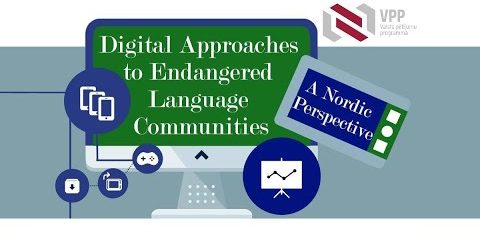
October 12
UL Livonian Institute joins the Helsinki initiative on Multilingualism in Scholarly Communication.
“In all languages” campaign is a wake-up call for policy-makers, leaders, universities, research institutions, research funders, libraries, and researchers to promote multilingualism in scholarly communication https://www.helsinki-initiative.org/en.
October 9
LU Livonian Institute took part in the Livonian Culture Days in Ventspils (Vǟntas)
You can read more about the event on the news portal LSM.lv and on the event’s FB page. Photos from the event can be viewed here.
September 30
Minister of Foreign Affairs of the Republic of Estonia visits the UL Livonian Institute
During an official visit, the UL Livonian Institute was visited by the Minister of Foreign Affairs of the Republic of Estonia Urmas Reinsalu. During the visit, the Minister got acquainted with the activities of the UL Livonian Institute, the Livonian and Estonian heritage in Latvia, as well as confirmed the support of the Republic of Estonia for efforts to preserve, research and develop the Livonian language and cultural heritage in Latvia.
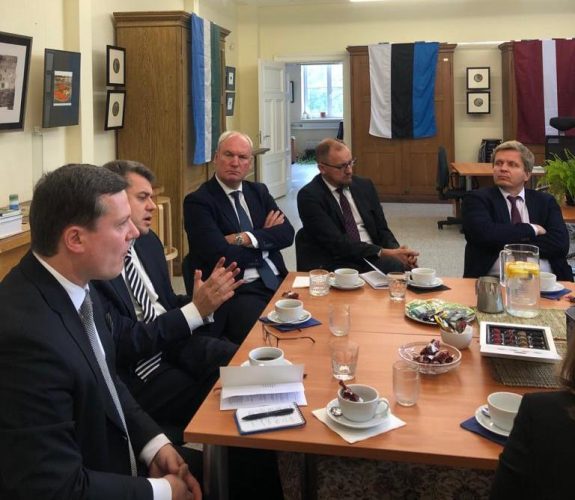
September 26
Participation in the European Language Days 2020 in Ludza
The opening ceremony of “Ludza Estonian ABC-book” on the European Day of Languages, in the Small Hall of Ludza Folk House.
September 24–25
European Language Day in Helsinki
September 23
Participation in Annual Foundation for Endangered Languages Annual Conference FEL24
September 21
The UL Livonian Institute celebrates its 2 year anniversary
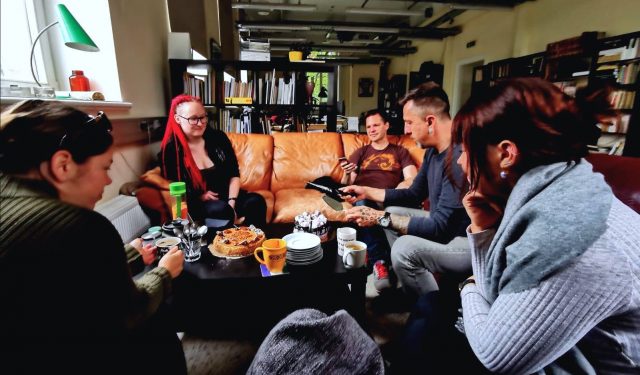
September 18
The Ludza Estonian ABC-book has been published.
The first Ludza Estonian ABC-book’s author is Uldis Balodis, a researcher at the UL Livonian Institute, and the publishers are the UL Livonian Institute and the Ludza Library.
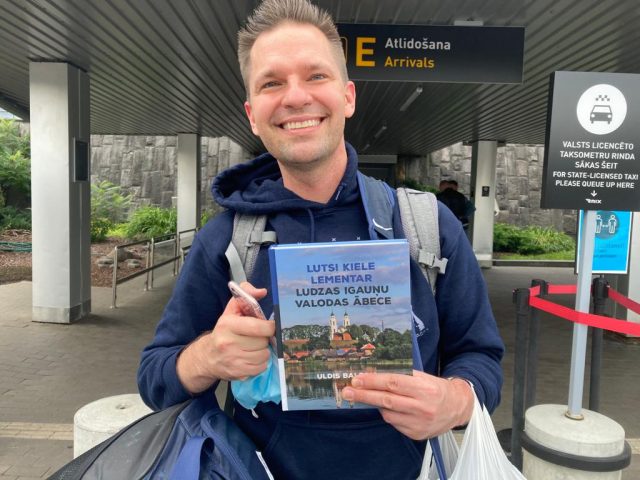
Valta Ernštreita foto
August 17–19
A workshop for Livonian language researchers
The teaser or in Livonian kiužik for all seven lessons can be viewed here.
August 14
The full versions of the 7 Livonian language lessons have been uploaded to the UL Livonian Institute YouTube
On August 17th–19th a Workshop for Livonian language researchers – UL Livonian Institute and University of Tartu. It took place in Mazirbe (Irē).
July 27
Taking part in the camp and summer school Mierlinkizt
The UL Livonian Institute taught four Livonian language classes. The children watched the latest versions of Livonian language lessons, which are now available on the institute’s YouTube channel.
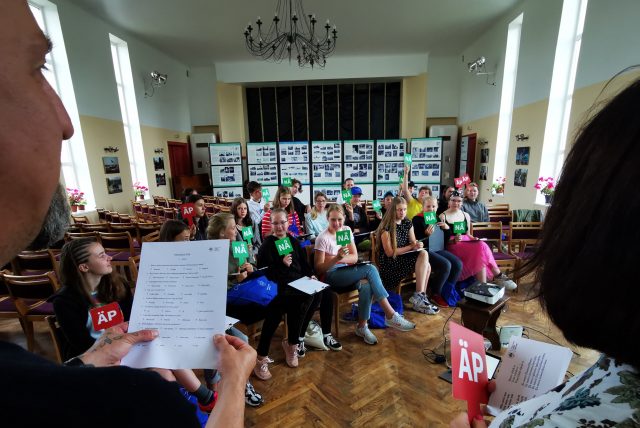
July 24
UL Livonian Institute participates at the working seminar on planned Law of Historical Lands of Latvians.
President Egils Levits invited historians, researchers, linguists, representatives of non-governmental organizations of Latvian historical lands and cultural spaces, experts and opinion leaders in this field to discuss the necessity and goals of the draft law on future Latvian lands initiated by the President, as well as Latvian historical lands and plan for the sustainability and development of cultural premises.
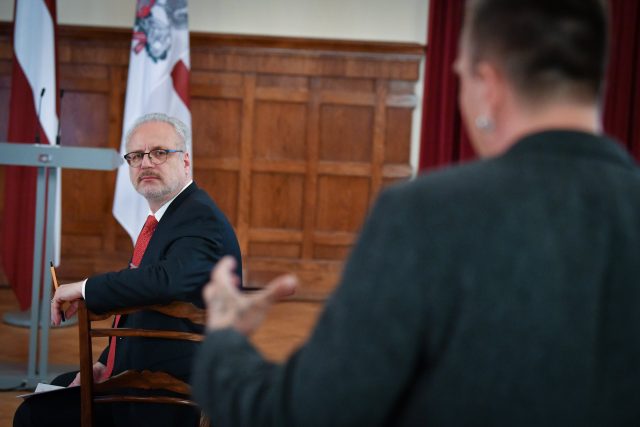
July 1
Taking part in a thematic culture work group for the development of the Kurzeme Planning Region Development Program 2021–2027.
Participation in the Kurzeme Planning Region local government development seminar – a work group on the field of culture for the development of the Kurzeme Development Program 2021–2027.
May 29
Seven Livonian language lessons – 6th and 7th lesson
Seven Livonian language lessons – the 6th lesson “Numbers in Livonian” and the 7th lesson “Words that have come from the Livonian language”. During the sixth lesson you can learn to count up to ten and with the help of number words you can get an insight into the sound of Latvian and Livonian relation. During the conversation, you can learn about the contribution and help given by the Livonian relatives, Estonians and Finns, towards the preservation of the Livonians and their cultural heritage. During the sixth hour you will learn about one of the most notable Livonians – Pētõr Damberg – and his contribution, as well as the Livonian folklore in general. The seventh lesson teaches to recognise words that have entered the Latvian language from the Livonian language. You’ll hear about different places in Latvia, including the Livonian-inhabited areas of the Daugava from Aizkraukle to Riga, where the Livonian heritage can be found. During the lesson, you can learn about Livonian footprints in literary works important to the Latvian culture (in Andrejs Pumpurs’ epic “Lāčplēsis”), as well as the Livonian roots of Riga and where Livonians can be seen in Riga.
May 28
The Head of The University of Latvia Livonian Institute Receives an International Award from the Estonian Ministry of Education And Science
Valts Ernštreits, Head of the University of Latvia Livonian Institute, has received the Ilmapuu (World Tree) Award from the Kindred Peoples’ Programme of the Ministry of Education and Research of the Republic of Estonia. The award was established in 2010 and is granted annually to one representative of Finno-Ugric indigenous peoples for active citizenship.
See more about the prize and the winner here.
May 25
The Livonian Institute of the University of Latvia joins the Digital Humanities initiative
The UL Livonian Institute joins the initiative by Latvian research and educational institutions that are the most active in the field of digital humanities. It aims to introduce and advance digital humanities in Latvia, to provide information about current events, resources and main actors in the field, as well as to enhance cooperation both on the national and international level.
May 22
Seven Livonian language lessons – 5th lesson
Seven Livonian language lessons – the fifth lesson “Names of Relatives in the Livonian Language” together with Ulla Fraser. The aim of the lesson is to introduce the names of relatives in the Livonian language; to tell about the formation of dialects and the introduction of new words into a language; to create an insight into the process of formation of Livonian modern culture and the Livonian struggle for survival.
May 15
Seven Livonian language lessons – 4th lesson
Seven Livonian language lessons – the fourth lesson “Place names in the Livonian language” together with Baiba Šuvcāne. Places in the Livonian language have their own names, which sometimes differ significantly from the Latvian ones. The Livonian Coast was formed after the sea retreated, and its daily life and management has always been connected with the sea.
May 8
Seven Liv language lessons – 3rd lesson
Seven Liv language lessons – third lesson “Colors in the Livonian language” together with Dāvids Ernštreits. The Livonian flag is ōļaz-vālda-siņņi (green, white, blue), and these colors reflect the view that the fisherman sees from the sea to the shore.
April 24
Seven Livonian language lessons – 2nd lesson
Seven Livonian language lessons – second lesson “The sounds of the Livonian language” with Julgī Stalte. The aim of the second lesson is to introduce the alphabet and sounds of the Livonian language; to provide an insight into the Livonian traditions; to encourage understanding of the connection between language and culture.
April 17
TV project Tavaklase.lv – an opportunity for students to learn about the Livonian language and culture.
For the first time in the history of Latvia, all students are offered the opportunity to get to know the language and culture of Latvia’s indigenous people – the Livonians. This big opportunity has been created together with the Ministry of Education and Science. In the future, it is planned to place the educational material in an expanded form on the Youtube channel of the LU Livonian Institute and, if possible, with more episodes.
The first lesson of the Livonian language can be viewed here. During the lesson, you can learn about the linguistic diversity of the world; understand the term “indigenous people”, and master some polite phrases in the Livonian language.
April 14
“The brave rescue work of the Livonian spirit”
An invitation to submit ideas to gather all smaller and bigger ideas to plan the work that is needed to preserve the Livonian culture for us and future generations. More about the idea here.
March 21
The Big Day of Bird Waking
Traditionally, the waking of birds occurs on the first Saturday after the spring solstice, and this year the spring begins on March 20 at 5 and 50 minutes. Bird waking is an ancient Livonian ritual traditionally held on the spring solstice morning or the first Easter morning when the song “Tšītšōrlinkizt” is sung, which is said to be of magical nature. The lyrics and more about tradition can be found here.
Not only does the wake-up ritual hasten the arrival of spring, it also has a magical powers: it strengthens your health and helps fulfill the desires of the heart. We invite you to post your captured bird waking photos and videos on the social media with the hashtag #tšītšōr or send them to info@livones.net.
Here you can see the waking rituals performed by Valts Ernštreits, Zane Ernštreite un Ulla Frasere.
March 5
Conference session on digital Latvian language resources and tools in common research infrastructure also included a presentation on the Livonian digital resources
In the UL Section of 78th International Scientific Conference “DIGITAL LATVIAN LANGUAGE RESOURCES AND TOOLS IN COMMON RESEARCH INFRASTRUCTURE” Valts Ersnštreits talked about the electronic resources for Livonian language, its future and projects that are currently being worked on.
March 4
On the broadcast 900 seconds a little on the Livonian Cultural Space’s movement towards inclusion into the UNESCO List of Intangible Cultural Heritage.
On the 900 seconds a conversation with the head of the Livonian Institute Valts Ernštreits and the head of the Salaspils mixed choir “Lōja” Ģirts Gailītis. The Livonian language is one of the main components of the Livonian cultural space, and in order to preserve it, the Livonian culture is asked to be included in the UNESCO Intangible Cultural Heritage List. You can watch the conversation here.
February 27
The UL Livonian Institute participates in a discussion about the future cultural policy of Latvia!
The Ministry of Culture of the Republic of Latvia held one of the discussions on the new Cultural Policy Guidelines 2021–2027. A wide range of professionals met in discussions to prepare the new document. This document is being drafted with wide involvement, exchange of views and ideas, so that it can serve as a reference for the years to come.
February 24
Children and youth of the school “Mierlinkizt” study Livonian in a Memrise course created by Reinis Zumbergs and children themselves.
February 21
Online Livonian language lesson
On the International Day of the Mother Language everyone was invited to learn the Livonian language online at the UL Livonian Institute channel on YouTube, where the video recording is still available today. During the Livonian language lesson, with the help of researchers from the LU Livonian Institute, the Livonian children’s and youth’s summer school Mierlinkizt children and Salaspils mixed choir Lōja singers, they could gain insight into the Livonian language, and learn the Livonian folksong Tšītšōrlinkizt – a bird waking song, with which the Livonians traditionally sound the spring.
You can read more about the Livonian language week here.
International Mother Language Day – The Livonian cultural space is on its way towards UNESCO’s intangible heritage list!
We celebrated the International Mother Language Day at the UL Livonian Institute, organized by our institute with the support of the Latvian National Commission for UNESCO and the Latvian National Centre for Culture.
Livonian organisations have prepared a letter wishing to nominate the Livonian Cultural Space to the UNESCO List of Intangible Cultural Heritage in Need of Immediate Conservation. On February 21, the letter was symbolically handed over to the Council of the Intangible Cultural Heritage of the Latvian National Centre for Culture. The Livonian cultural space has been included in the list of Latvian Intangible Cultural Heritage since 2018.
Participating in the International Scientific Conference “Language in Society” to commemorate the 147th anniversary of academician Jānis Endzelīns.
February 18
The Embassy of Hungary in Latvia visits the UL Livonian Institute.
The sound of Livonian on Radio1 Latvia.
Experience the sound of Livonian on the LR1 broadcast honouring the Mother Tongue Week. The sound of Livonian #1–5 (https://lr1.lsm.lv/lv/tema/ta-skan-libiesi.b362/).
February 14
Head of the Rozentals Society of Finland, Jenni Kallionsivu visited the Livonian Institute.
January 27
Courland’s Kreevins – Votes visit the UL Livonian Institute.
During the first meeting, opportunities for collaboration were discussed, i.e. Involvement of the Liv Institute in organizing this year’s Zemgale Russian gathering.
Together with the Livonian children and Līvõd Īt, we unveiled the 150th anniversary year of the Livonian poet K. Stalte.
An article by Uldis Balozs, a LU LI researcher, on Ludza’s Estonians funded by the Finnish Kone Foundation.
January 25
Winter meeting with the Livonian children and youth participants of “Mierlinkizt” summer school.
The topic of the meeting – Kārlis Stalte.
January
The start of the year-long celebration of the 150th anniversary of the birth of Kōrli Stalte
2020 is the 150th anniversary of the birth of the outstanding Liv culture worker Kārlis Stalte (August 9, 1870 in Mazirbe – January 12, 1947, in Feberlina). Many events will be directly related to his name in the Livonian cultural space this year.
